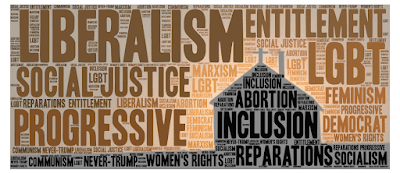While the terms low church and high church are not ordinarily categories a Lutheran might deal in, they have become broader than the Anglican usage in which they were initially used. Low church, historically, refers to those who give little emphasis to ritual, often having an emphasis on preaching, individual salvation and personal conversion.
The liberals of the early 20th century were willing to keep the form and trappings of Christianity all the while they were also stripping it of any doctrinal content and creedal identity. This was because they found these to conflict with a rationalist view of science and the world. These early liberals desired to maintain a moral authority within the faith but without the dogmatic content of Biblical Christianity. While there are pockets of this liberalism around, what we encounter today is simply not interested in Scripture as fact and truth nor is it necessarily interested in arguing about such things. What it is interested in is morality. Modern liberalism isn’t fighting a theological war but it is waging a war about what is ethical, moral, and the focus of Christian identity. That view is decidedly on the side of sexual liberation, population control, the freedom to explore gender identity, climate change, and a view of science that requires it to surrender objectivity for ideology. It is low church or high church or whatever because its values are not attached to liturgy or to a view of Scripture as much as they are to the cultural milieu of the day. That said, it is certainly more at home in low church ceremonial because it is more concerned with reason and race, justice and equality, and the celebration of diversity than it is any loyalty to the forms and ceremonial of the past.
It would seem to me that the future of orthodox Christianity lies with the so-called high church. This is true for the Missouri Synod at least and I think it is probably true for Rome as well. The liberal wing of Rome sees the greater need for a horizontal church over a vertical one and the disdain that progressives have for the Latin Mass is born in part of their desire to be rid of ancient ceremonial constriction to allow more local freedom and inculturation. In one respect, there is a certain kinship between those on the right of Rome and the conservative and ceremonial folk in Missouri. Neither one helps the other in any tangible way but we both appreciate the fight each brings to its own locale. In any case, the low church liberals have stolen most of every other denomination and jurisdiction of Christianity and left it with a hollow shell of its former missionary zeal -- preferring to argue over cultural and climate issues over Scripture, creed, and confession.

No comments:
Post a Comment